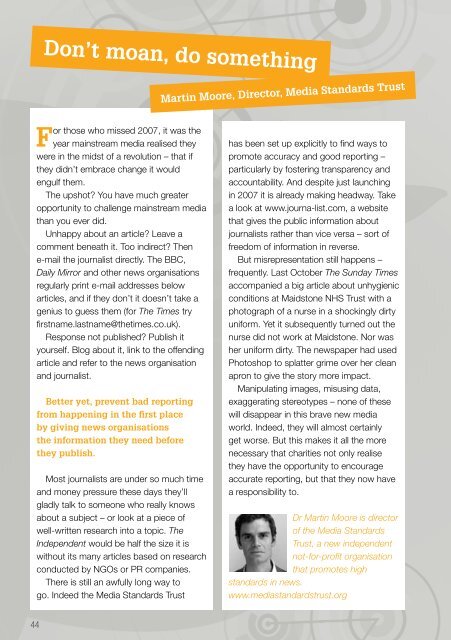Clever Communications - Voluntary Action Media Unit
Clever Communications - Voluntary Action Media Unit
Clever Communications - Voluntary Action Media Unit
You also want an ePaper? Increase the reach of your titles
YUMPU automatically turns print PDFs into web optimized ePapers that Google loves.
For those who missed 2007, it was the<br />
year mainstream media realised they<br />
were in the midst of a revolution – that if<br />
they didn’t embrace change it would<br />
engulf them.<br />
The upshot? You have much greater<br />
opportunity to challenge mainstream media<br />
than you ever did.<br />
Unhappy about an article? Leave a<br />
comment beneath it. Too indirect? Then<br />
e-mail the journalist directly. The BBC,<br />
Daily Mirror and other news organisations<br />
regularly print e-mail addresses below<br />
articles, and if they don’t it doesn’t take a<br />
genius to guess them (for The Times try<br />
firstname.lastname@thetimes.co.uk).<br />
Response not published? Publish it<br />
yourself. Blog about it, link to the offending<br />
article and refer to the news organisation<br />
and journalist.<br />
Better yet, prevent bad reporting<br />
from happening in the first place<br />
by giving news organisations<br />
the information they need before<br />
they publish.<br />
Most journalists are under so much time<br />
and money pressure these days they’ll<br />
gladly talk to someone who really knows<br />
about a subject – or look at a piece of<br />
well-written research into a topic. The<br />
Independent would be half the size it is<br />
without its many articles based on research<br />
conducted by NGOs or PR companies.<br />
There is still an awfully long way to<br />
go. Indeed the <strong>Media</strong> Standards Trust<br />
44<br />
Don’t moan, do something<br />
Martin Moore, Director, <strong>Media</strong> Standards Trust<br />
has been set up explicitly to find ways to<br />
promote accuracy and good reporting –<br />
particularly by fostering transparency and<br />
accountability. And despite just launching<br />
in 2007 it is already making headway. Take<br />
a look at www.journa-list.com, a website<br />
that gives the public information about<br />
journalists rather than vice versa – sort of<br />
freedom of information in reverse.<br />
But misrepresentation still happens –<br />
frequently. Last October The Sunday Times<br />
accompanied a big article about unhygienic<br />
conditions at Maidstone NHS Trust with a<br />
photograph of a nurse in a shockingly dirty<br />
uniform. Yet it subsequently turned out the<br />
nurse did not work at Maidstone. Nor was<br />
her uniform dirty. The newspaper had used<br />
Photoshop to splatter grime over her clean<br />
apron to give the story more impact.<br />
Manipulating images, misusing data,<br />
exaggerating stereotypes – none of these<br />
will disappear in this brave new media<br />
world. Indeed, they will almost certainly<br />
get worse. But this makes it all the more<br />
necessary that charities not only realise<br />
they have the opportunity to encourage<br />
accurate reporting, but that they now have<br />
a responsibility to.<br />
Dr Martin Moore is director<br />
of the <strong>Media</strong> Standards<br />
Trust, a new independent<br />
not-for-profit organisation<br />
that promotes high<br />
standards in news.<br />
www.mediastandardstrust.org


